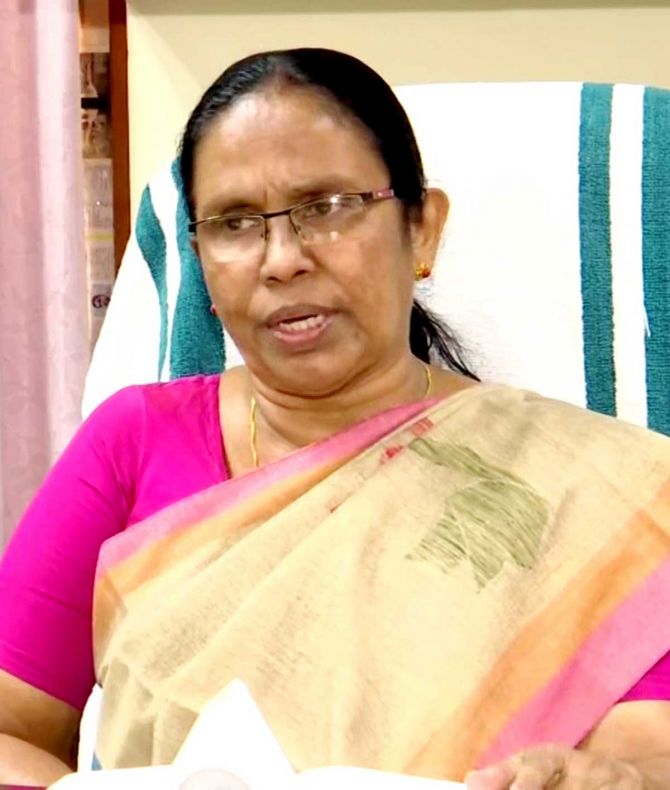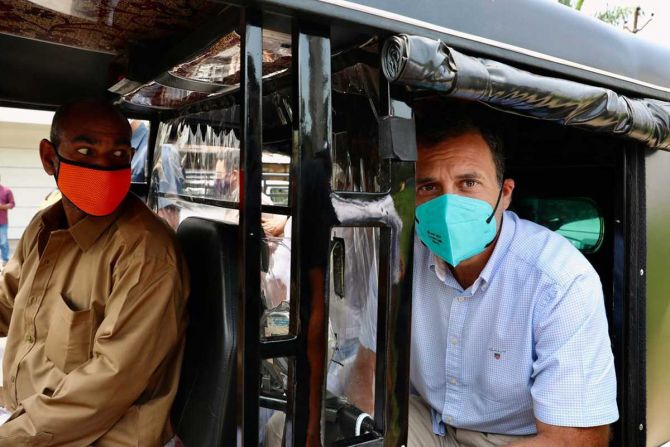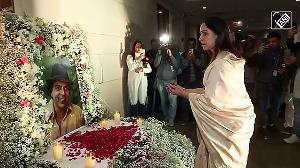Pinarayi is exploring the potentials of 'socialism with Indian characteristics'.
The next five years under Pinarayi's watch will be a transformative period for Kerala's development, observes M K Bhadrakumar.

Despite the caprice of democratic elections, it was a safe bet that the Left Democratic Front would secure a mandate for a second consecutive term to lead the government in Kerala. The local body elections last December were a compelling signpost.
At that time, I wrote in Rediff.com, Pinarayi can look forward to creating political history by beating incumbency and getting a renewed mandate for the LDF in the forthcoming state assembly election.'
However, this sort of 'wave' was not anticipated -- the LDF led by the Communist Party of India (Marxist) winning 99 seats in the 140-member state assembly, which is eight seats more than its strength in the outgoing assembly.
The 'wave"' swept through the state comprehensively. Quintessentially, it reflects the people's acclaim for the Pinarayi government's highly responsive functioning through the past challenging 5-year period, and their desire for continuity. The LDF fulfilled all its electoral pledges and more.

Through unprecedented natural calamities and the pandemic in the recent years, the people felt secure that an accessible, perceptive and sympathetic government was ever-present whose handling of the challenges was optimal. The people eagerly awaited the daily press briefings by Chief Minister Pinarayi Vijayan during the 'first wave' of the pandemic.
The additional welfare schemes mitigated their hardships. The high level of public satisfaction manifested in the whopping majority of 60,000 votes handed down to Health Minister K K Shailaja 'Teacher', the largest margin in the state's electoral history.
It was an outpouring of affection, gratitude, adulation and public confidence in an unpretentious self-effacing personality who fought the pandemic every inch of the way -- and a 'thank you' to the Pinarayi government.
Simply put, Kerala never before witnessed such an accent on development-oriented governance blending seamlessly with social welfare. The social support for the poor and the needy was significantly strengthened and expanded.
Meanwhile, the CPI-M in Kerala under Pinarayi Vijayan's leadership is also making a historic transition. Lessons have been learnt from the decline of the Communist movement in West Bengal and Tripura.
Development economics is remodelled with the realisation that solving the problem of poverty is not as simple as reallocating income, and focus should also be on constantly improving fiscal, economic, and social conditions whereby the state's simple, low-income economy is eventually transformed into a modern industrial economy.
Pinarayi is a rare politician who combines inspiring persistence and political awareness with the ability to plan and adapt. He instinctively senses the precise moment when it is possible to change public sentiment -- yet, with a talent for well-timed 'unreasonableness' too.
Steady nerves and demonic energy are his strategic assets. Pinarayi is aiming for the stars.

A three-day global conference in February at Thiruvananthapuram under the rubric 'Kerala Looks Ahead' aimed at a paradigm shift in the State's progress in the coming years -- building on historic achievements in welfare and invigorating growth and development through technology. The government invited Nobel Laureate Joseph Stiglitz to provide a compass for the voyage ahead.
In a nutshell, Pinarayi is exploring the potentials of 'socialism with Indian characteristics'. The next five years under Pinarayi's watch will be a transformative period for Kerala's development. And the measure of his success will be crucial for the trajectory of the Communist movement at the national level.
Kerala was the first state in the country to elect a Communist government and today it happens to be the only state which is still ruled by the Communist parties. That makes Kerala the crucible of new thinking in progressive politics in the country.
A second factor contributing to the LDF victory in the state election has been the uncompromising stance that the Pinarayi government took for safeguarding the ideals and principles of secularism.
The non-Hindu communities could sense that there has been a concerted campaign by the BJP and the Sangh Parivar to inject the 'communal virus' into Kerala's body polity.
The LDF government stoutly resisted and thwarted the BJP's nefarious agenda. The fact that despite such a delicately balanced demography, the state never witnessed a communal clash speaks for itself.
Third, of course, the Opposition parties failed miserably to offer any alternative political agenda. To be sure, this also underscores that the 'bipolarity' in the state's politics is in a state of meltdown, and what emerges out of the current churning time only can tell. This needs some explanation.

For a start, this election turned out to be a 'unipolar moment' in Kerala's politics. The Opposition not only failed to offer an alternate agenda, it did not have a single leader who would measure up to Pinarayi as equal. It was a bit like Gulliver in Lilliput -- except that this Gulliver never went into slumber and the tiny Lilliputians got no chance to tie him down.
The crushing defeat of the main Opposition United Democratic Front -- securing only 41 seats -- plunges the Congress party into an existential crisis. The spectre that is haunting the party is an implosion.
The UDF's social contract and its Muslim-Christian power base is unraveling. The creeping 'soft Hindutva' within the Congress party unnerves the minority communities.
Symptomatic of it, the Muslim League could retain alright the Malappuram Lok Sabha seat, the party's citadel, in the by-election last month, but its massive majority of 2.60 lakhs in 2019 dropped dramatically to 1.14 lakhs, while the CPI-M candidate garnered an additional 94,000 votes.
And this within the space of just two years. Shoals are forming and as the Hebrew Bible says, it is a place of darkness to which the dead go.

The Congress failed to catch the imagination of the people with its negative campaigning. The party fancied that Rahul Gandhi and Priyanka Vadra, its trump cards, would turn the tide in its favour, but they created an impression among people as if they were holidaying. The fun and frolic didn't translate as votes.
The factionalism within the Congress will get even more acute now and an insurrection against the jaded leadership cannot be ruled out. Defections may weaken the party further.
The election already brought into relief its organisational weaknesses. In such a dismal scenario, the UDF loses its raison d'etre. Make no mistake, all this is happening at a time when the party's high command in Delhi is in drift.
Logically, the BJP ought to be the net gainer in such circumstances. But then, the BJP's plight is not very different, either. Narendra Modi and Amit Shah and a host of central ministers descended on the state to campaign.

Certainly, the party's war chest was decidedly bigger than the CPI-M or Congress's. Money was never a problem, but when the crunch time came, the party failed to retain even the solitary seat it won in 2016.
The BJP is earning the reputation of being an empty vessel that makes a lot of sound. Its insipid state leadership apart, its fanatical, polarising ideology alienates a big majority of Keralites. It stands isolated.
Again, Modi's image is wearing thin. The discerning, politically literate audience in Kerala has seen through his theatrical stage performance and empty promises.
In fact, much of the present sheen is actually due to reflected glory, simply because the BJP holds the levers of power at the Centre. As with the Congress, te BJP's state unit is also faction-ridden.
The malaise within the BJP is such that it is perpetually in a state of suspended animation: The party's self-styled leaders are forever ganging up to pull down any single leader who happens to be on the ascendance at any given time.
At the moment, there seems to be much heartburn for some obscure reason over the rise and rise of central minister V Muraleedharan.
Ambassador M K Bhadrakumar, who served the Indian Foreign Service for more than 29 years, is a long-time observer of Kerala politics.
Feature Presentation: Ashish Narsale/Rediff.com










